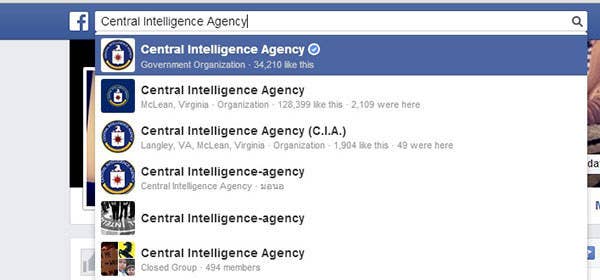
WASHINGTON — On Friday, the Central Intelligence Agency scored a PR coup when the agency's first-ever tweet was retweeted nearly 270,000 times. For a government entity not often on the right side of feel-good stories, the cheeky leveraging of social media was a total victory.
Behind the scenes, the federal government was preparing to launch a less flashy social media program officials say will have wide-ranging implications when it comes to the way the U.S. government connects with the citizens it serves.
In terms of social media, the federal government has had a problem common to the celebrities: Users who wanted to connect with federal agencies were confronted with a raft of poseurs pretending to be someone they weren't.
Fixing the problem on Facebook used to be a real headache for the government. The company would only verify government accounts through a cumbersome process that left many government agencies without the coveted blue "verified" check mark and many agency leaders worried users were following fakes. Many agencies kept Facebook and its hundreds of millions of American users at a distance because of it.
"Using Facebook was viewed by some as extremely risky and not worth it," a defense official told BuzzFeed. "But verification by Facebook means we're able to better address security concerns in engaging with the public."
On Friday, Facebook and the government cut a deal that gave the feds a special pathway around the company's normal verification system.
"Fake accounts, misinformation and phishing scams can create barriers between citizens and public services on the internet, especially when popularity can factor more into verification than the potential impact of unverified public services," reads a federal government announcement trumpeting the Federal Social Media Registry, the central repository of government social media accounts. Facebook has agreed to verify accounts listed in the registry, officials say, and over the weekend the process began with more than 1,000 accounts.
The program will continue verifying more government accounts in the coming days. For social media managers at agencies outside the public spotlight — or those so famous that people have made fake versions of them — the deal with Facebook makes it far easier to convince senior officials that Facebook is safe.
"Telling our leadership that we're verified 'just like the White House and NASA' is a major win," the defense official said.
Other social media networks still have a verification problem, however. While the main account of the Federal Emergency Management Agency is verified on Twitter, for example, regional branches of FEMA's regional accounts — which contain locality-specific information that could be valuable in a disaster — still lack the blue checkmark.
